- Home
- Alfred Bester
Hobson’s Choice
Hobson’s Choice Read online
Hobson’s Choice
This is a warning to accomplices like you, me and Addyer.
Can you spare price of one cup coffee, honorable sir? I am indigent organism which are hungering.
By day, Addyer was a statistician. He concerned himself with such matters as statistical tables, averages and dispersions, groups that are not homogeneous and random sampling. At night, Addyer plunged into an elaborate escape fantasy divided into two parts. Either he imagined himself moved back in time a hundred years with a double armful of the Encyclopaedia Britannica, best-sellers, hit plays and gambling records; or else he imagined himself transported forward in time a thousand years to the Golden Age of perfection.
There were other fantasies which Addyer entertained on odd Thursdays, such as (by a fluke) becoming the only man left on earth with a world of passionate beauties to fecundate; such as acquiring the power of invisibility which would enable him to rob banks and right wrongs with impunity; such as possessing the mysterious power of working miracles.
Up to this point you and I and Addyer are identical. Where we part company is in the fact that Addyer was a statistician.
Can you spare cost of one cup coffee, honorable miss? For blessed charitability? I am beholden.
On Monday, Addyer rushed into his chief’s office, waving a sheaf of papers. “Look here, Mr. Grande,” Addyer sputtered. “I’ve found something fishy. Extremely fishy . . . In the statistical sense, that is.”
“Oh, hell,” Grande answered. “You’re not supposed to be finding anything. We’re in between statistics until the war’s over.”
“I was leafing through the Interior Department’s reports. D’you know our population’s up?”
“Not after the atom bomb it isn’t,” said Grande. “We’ve lost double what our birthrate can replace.” He pointed out the window to the twenty-five-foot stub of the Washington Monument. “There’s your documentation.”
“But our population’s up 3.0915 percent.” Addyer displayed his figures. “What about that, Mr. Grande?”
“Must be a mistake somewhere,” Grande muttered after a moment’s inspection. “You’d better check.”
“Yes, sir,” said Addyer scurrying out of the office. “I knew you’d be interested, sir. You’re the ideal statistician, sir.” He was gone.
“Poop,” said Grande and once again began computing the quantity of bored respirations left to him. It was his personalized anesthesia.
On Tuesday, Addyer discovered that there was no correlation between the mortality/birthrate ratio and the population increase. The war was multiplying mortality and reducing births; yet the population was minutely increasing. Addyer displayed his discovery to Grande, received a pat on the back and went home to a new fantasy in which he woke up a million years in the future, learned the answer to the enigma and decided to remain amid snow-capped mountains and snow-capped bosoms, safe under the aegis of a culture saner than Aureomycin.
On Wednesday, Addyer requisitioned the comptometer and file and ran a test check on Washington, D.C. To his dismay he discovered that the population of the former capital was down 0.0029 percent. This was distressing, and Addyer went home to escape into a dream about Queen Victoria’s Golden Age where he amazed and confounded the world with his brilliant output of novels, plays and poetry, all cribbed from Shaw, Galsworthy and Wilde.
Can you spare price of one coffee, honorable sir? I am distressed individual needful of chariting.
On Thursday, Addyer tried another check, this time on the city of Philadelphia. He discovered that Philadelphia’s population was up 0.095 9 percent. Very encouraging. He tried a rundown on Little Rock. Population up 1.1329 percent. He tested St. Louis. Population up 2.0924 percent. . . and this despite the complete extinction of Jefferson County owing to one of those military mistakes of an excessive nature.
“My God!” Addyer exclaimed, trembling with excitement. “The closer I get to the center of the country, the greater the increase. But it was the center of the country that took the heaviest punishment in the buz-raid. What’s the answer?”
That night he shuttled back and forth between the future and the past in his ferment, and he was down at the shop by AM. He put a twenty-four-hour claim on the compo and files. He followed up his hunch and he came up with a fantastic discovery which he graphed in approved form. On the map of the remains of the United States he drew concentric circles in colors illustrating the areas of population increase. The red, orange, yellow, green and blue circles formed a perfect target around Finney County, Kansas.
“Mr. Grande,” Addyer shouted in a high statistical passion, “Finney County has got to explain this.”
“You go out there and get that explanation,” Grande replied, and Addyer departed.
“Poop,” muttered Grande and began integrating his pulse rate with his eye-blink.
Can you spare price of one coffee, dearly madam? I am starveling organism requiring nutritiousment.
Now, travel in those days was hazardous. Addyer took ship to Charleston (there were no rail connections remaining in the North Atlantic states) and was wrecked off Hatteras by a rogue mine. He drifted in the icy waters for seventeen hours, muttering through his teeth: “Oh, Christ! If only I’d been born a hundred years ago.”
Apparently this form of prayer was potent. He was picked up by a navy sweeper and shipped to Charleston where he arrived just in time to acquire a subcritical radiation burn from a raid which fortunately left the railroad unharmed. He was treated for the burn from Charleston to Macon (change) from Birmingham to Memphis (bubonic plague) to Little Rock (polluted water) to Tulsa (fallout quarantine) to Kansas City (the O.K. Bus Co. Accepts No Liability for Lives Lost through Acts of War) to Lyonesse, Finney County, Kansas.
And there he was in Finney County with its great magma pits and scars and radiation streaks; whole farms blackened and razed; whole highways so blasted they looked like dotted lines; whole population 4-F. Clouds of soot and fallout neutralizers hung over Finney County by day, turning it into a Pittsburgh on a still afternoon. Auras of radiation glowed at night, highlighted by the blinking red warning beacons, turning the county into one of those overexposed night photographs, all blurred and cross-hatched by deadly slashes of light.
After a restless night in the Lyonesse Hotel, Addyer went over to the county seat for a check on their birth records. He was armed with the proper credentials, but the county seat was not armed with the statistics. That excessive military mistake again. It had extinguished the seat.
A little annoyed, Addyer marched off to the County Medical Association office. His idea was to poll the local doctors on births. There was an office and one attendant who had been a practical nurse. He informed Addyer that Finney County had lost its last doctor to the army eight months previous. Midwives might be the answer to the birth enigma but there was no record of midwives. Addyer would simply have to canvass from door to door, asking if any lady within practiced that ancient profession.
Further piqued, Addyer returned to the Lyonesse Hotel and wrote on a slip of tissue paper: HAVING DATA DIFFICULTIES. WILL REPORT AS SOON AS INFORMATION AVAILABLE. He slipped the message into an aluminum capsule, attached it to his sole surviving carrier pigeon and dispatched it to Washington with a prayer. Then he sat down at his window and brooded.
He was aroused by a curious sight. In the street below, the O.K. Bus Co. had just arrived from Kansas City. The old coach wheezed to a stop, opened its door with some difficulty and permitted a one-legged farmer to emerge. His burned face was freshly bandaged. Evidently this was a well-to-do burgess who could afford to travel for medical treatment. The bus backed up for the return trip to Kansas City and honked a warning horn. That was when the curious sight began.
From nowhe
re. . . absolutely nowhere. . . a horde of people appeared. They skipped from back alleys, from behind rubble piles; they popped out of stores, they filled the street. They were all jolly, healthy, brisk, happy. They laughed and chatted as they climbed into the bus. They looked like hikers and tourists, carrying knapsacks, carpetbags, box lunches and even babies. In two minutes the bus was filled. It lurched off down the road, and as it disappeared Addyer heard happy singing break out and echo from the walls of rubble.
“I’ll be damned,” he said.
He hadn’t heard spontaneous singing in over two years. He hadn’t seen a
carefree smile in over three years. He felt like a color-blind man who was seeing the full spectrum for the first time. It was uncanny. It was also a little blasphemous.
“Don’t those people know there’s a war on?” he asked himself.
And a little later: “They looked too healthy. Why aren’t they in uniform?”
And last of all: “Who were they anyway?”
That night Addyer’s fantasy was confused.
Can you spare price of one cup coffee, kindly sir? I am estrangered and faintly from hungering.
The next morning Addyer arose early, hired a car at an exorbitant fee, found he could not buy any fuel at any price and ultimately settled for a lame horse. He was allergic to horse dander and suffered asthmatic tortures as he began his house-to-house canvass. He was discouraged when he returned to the Lyonesse Hotel that afternoon. He was just in time to witness the departure of the O.K. Bus Co.
Once again a horde of happy people appeared and boarded the bus. Once again the bus hirpled off down the broken road. Once again the joyous singing broke out.
“I will be damned,” Addyer wheezed.
He dropped into the county surveyor’s office for a large-scale map of Finney County. It was his intent to plot the midwife coverage in accepted statistical manner. There was a little difficulty with the surveyor who was deaf, blind in one eye and spectacleless in the other. He could not read Addyer’s credentials with any faculty or facility. As Addyer finally departed with the map, he said to himself, “I think the old idiot thought I was a spy.”
And later he muttered, “Spies?”
And just before bedtime: “Holy Moses! Maybe that’s the answer to them.” That night he was Lincoln’s secret agent, anticipating Lee’s every move, outwitting Jackson, Johnston and Beauregard, foiling John Wilkes Booth, and being elected President of the United States by 1968.
The next day the O.K. Bus Co. carried off yet another load of happy people.
And the next.
And the next.
“Four hundred tourists in five days,” Addyer computed. “The country’s filled with espionage.”
He began loafing around the streets trying to investigate these joyous travelers. It was difficult. They were elusive before the bus arrived. They had a friendly way of refusing to pass the time. The locals of Lyonesse knew nothing
about them and were not interested. Nobody was interested in much more than painful survival these days. That was what made the singing obscene.
After seven days of cloak-and-dagger and seven days of counting, Addyer suddenly did the big take. “It adds up,” he said. “Eighty people a day leaving Lyonesse. Five hundred a week. Twenty-five thousand a year. Maybe that’s the answer to the population increase.” He spent fifty-five dollars on a telegram to Grande with no more than a hope of delivery. The telegram read:
“EUREKA. I HAVE FOUND (IT).”
Can you spare price of lone cup coffee, honorable madam? I am not tramp-handler but destitute life form.
Addyer’s opportunity came the next day. The O.K. Bus Co. pulled in as usual. Another crowd assembled to board the bus, but this time there were too many. Three people were refused passage. They weren’t in the least annoyed. They stepped back, waved energetically as the bus started, shouted instructions for future reunions and then quietly turned and started off down the street.
Addyer was out of his hotel room like a shot. He followed the trio down the main street, turned left after them onto Fourth Avenue, passed the ruined schoolhouse, passed the demolished telephone building, passed the gutted library, railroad station, Protestant church, Catholic church . . . and finally reached the outskirts of Lyonesse and then open country.
Here he had to be more cautious. It was difficult stalking the spies with so much of the dusky road illuminated by warning lights. He wasn’t suicidal enough to think of hiding in radiation pits. He hung back in an agony of indecision and was at last relieved to see them turn off the broken road and enter the old Baker farmhouse.
“Ah-ha!” said Addyer.
He sat down at the edge of the road on the remnants of a missile and asked himself: “Ah-ha what?” He could not answer, but he knew where to find the answer. He waited until dusk deepened to darkness and then slowly wormed his way forward toward the farmhouse.
It was while he was creeping between the deadly radiation glows and only occasionally butting his head against grave markers that he first became aware of two figures in the night. They were in the barnyard of the Baker place and were performing most peculiarly. One was tall and thin. A man. He stood stock-still, like a lighthouse. Upon occasion he took a slow, stately step with infinite caution and waved an arm in slow motion to the other figure. The second was also a man. He was stocky and trotted jerkily back and forth.
As Addyer approached, he heard the tall man say: “Rooo booo fooo mooo hwaaa boo fooo.”
Whereupon the trotter chattered, “Wd-nk-kd-ik-md-pd-ld-nk.”
Then they both laughed: the tall man like a locomotive, the trotter like a chipmunk. They turned. The trotter rocketed into the house. The tall man drifted in. And that was amazingly that.
“Oh-ho,” said Addyer.
At that moment a pair of hands seized him and lifted him from the ground. Addyer’s heart constricted. He had time for one convulsive spasm before something vague was pressed against his face. As he lost consciousness his last idiotic thought was of telescopes.
Can you spare price of solitary coffee for no-loafing unfortunate, honorable sir? Charity will blessings.
When Addyer awoke he was lying on a couch in a small whitewashed room. A gray-haired gentleman with heavy features was seated at a desk alongside the couch, busily ciphering on bits of paper. The desk was cluttered with what appeared to be intricate timetables. There was a small radio perched on one side.
“L-Listen . . .“ Addyer began faintly.
“Just a minute, Mr. Addyer,” the gentleman said pleasantly. He fiddled with the radio. A glow germinated in the middle of the room over a circular copper plate and coalesced into a girl. She was extremely nude and extremely attractive. She scurried to the desk, patted the gentleman’s head with the speed of a pneumatic hammer. She laughed and chattered, “Wd-nk-tk-ik-Itnk.”
The gray-haired man smiled and pointed to the door. “Go outside and walk it off,” he said. She turned and streaked through the door.
“It has something to do with temporal rates,” the gentleman said to Addyer. “I don’t understand it. When they come forward they’ve got accumulated momentum.” He began ciphering again. “Why in the world did you have to come snooping, Mr. Addyer?”
“You’re spies,” Addyer said. “She was talking Chinese.”
“Hardly. I’d say it was French. Early French. Middle fifteenth century.”
“Middle fifteenth century!” Addyer exclaimed.
“That’s what I’d say. You begin to acquire an ear for those stepped-up tempos. Just a minute, please.”
He switched the radio on again. Another glow appeared and solidified into a nude man. He was stout, hairy and lugubrious. With exasperating slowness
he said, “Mooo fooo blooo wawww hawww p000.”
The gray-haired man pointed to the door. The stout man departed in slow motion.
“The way I see it,” the gray-haired man continued conversationally, “when they come back they’re swimm
ing against the time current. That slows ‘em down. When they come forward, they’re swimming with the current. That speeds ‘em up. Of course, in any case it doesn’t last longer than a few minutes. It wears off.”
“What?” Addyer said. “Time travel?”
“Yes. Of course.”
“That thing Addyer pointed to the radio. “A time machine?”
“That’s the idea. Roughly.”
“But it’s too small.”
The gray-haired man laughed.
“What is this place anyway? What are you up to?”
“It’s a funny thing,” the gray-haired man said. “Everybody used to speculate about time travel. How it would be used for exploration, archaeology, historical and social research and so on. Nobody ever guessed what the real use would be. . . . Therapy.”
“Therapy? You mean medical therapy?”
“That’s right. Psychological therapy for the misfits who won’t respond to any other cure. We let them emigrate. Escape. We’ve set up stations every quarter century. Stations like this.” -
“I don’t understand.”
“This is an immigration office.”
“Oh, my God!” Addyer shot up from the couch. “Then you’re the answer to the population increase. Yes? That’s how I happened to notice it. Mortality’s up so high and birth’s down so low these days that your time-addition becomes significant. Yes?”
“Yes, Mr. Addyer.”
“Thousands of you coming here. From where?”
“From the future, of course. Time travel wasn’t developed until C/H 127. That’s . . . oh, say, AD. 2505 your chronology. We didn’t set up our chain of stations until C/H 189.”
“But those fast-moving ones. You said they came forward from the past.”
“Oh, yes, but they’re all from the future originally. They just decided they went too far back.”
“Too far?”
The gray-haired man nodded and reflected. “It’s amusing, the mistakes people will make. They become unrealistic when they read history. Lose

 Galatea Galante
Galatea Galante Hobson’s Choice
Hobson’s Choice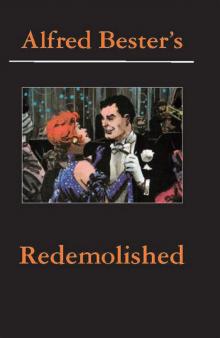 Redemolished
Redemolished The Flowered Thundermug
The Flowered Thundermug The Starcomber
The Starcomber Virtual Unrealities: The Short Fiction of Alfred Bester
Virtual Unrealities: The Short Fiction of Alfred Bester The Computer Connection
The Computer Connection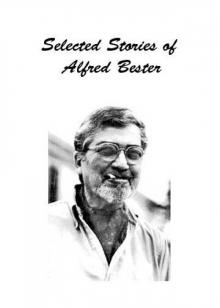 Selected Stories of Alfred Bester
Selected Stories of Alfred Bester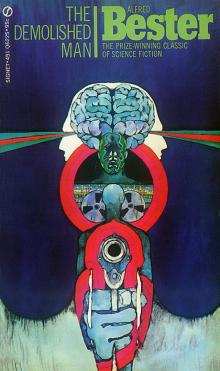 The Demolished Man
The Demolished Man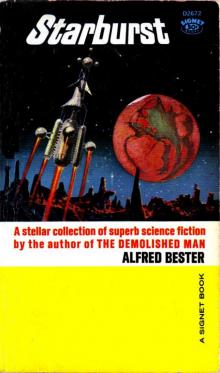 Starburst
Starburst Psychoshop
Psychoshop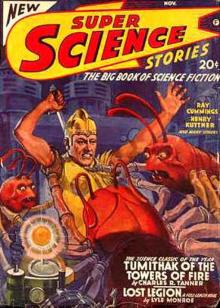 Biped Reegan
Biped Reegan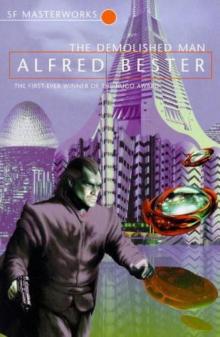 Demolished Man
Demolished Man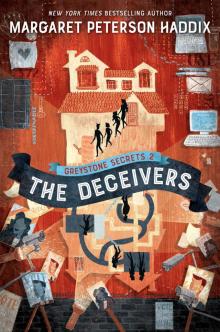 THE DECEIVERS
THE DECEIVERS GOLEM 100
GOLEM 100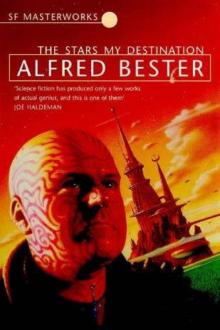 The Stars My Destination
The Stars My Destination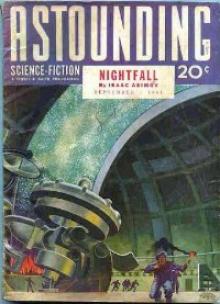 Adam And No Eve
Adam And No Eve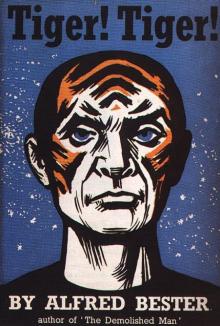 The Stars My Destination ( Tiger! Tiger! )
The Stars My Destination ( Tiger! Tiger! )